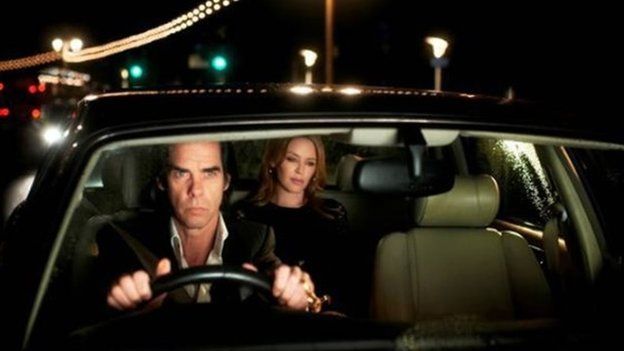Nick Cave becomes reluctant film star
- Published

Nick Cave is an unlikely subject for a music documentary.
The 56-year-old singer-songwriter, who has released 15 albums with his band the Bad Seeds, says he had no desire to make a film - until friends and artistic collaborators, Iain Forsyth and Jane Pollard, changed his mind.
But 20,000 Days on Earth is anything but a typical rock star documentary.
The film purports to depict the 20,000th day of the Australian singer's life - a day where he apparently lays his soul bare on a psychoanalyst's couch, interviews Kylie Minogue and Ray Winstone in a Jaguar as he drives around Brighton, and muses on his past as he traverses the Sussex Downs.
It is backed by strains of Cave's own music and, according to its co-director Jane Pollard, "it doesn't comply with either the conventions of documentary or drama".
"It's not a music concert film or a rock biography. Nick is staging real behaviour in fictional spaces, and this creates something new."
"I didn't want to do it," Cave says. "I was very, very reluctant to make anything at all."
"If I was going to do it, then it had to be different from a documentary about a person that bores the onlooker and demystifies the subject. You know - Nick Cave, washing the dishes, taking the kids to school, that kind of film.
"What happened was that myself and my band, the Bad Seeds, were recording our last album, Push the Sky Away."
"Iain and Jane had been friends since 2008, when we made a music video together. So I allowed them into the studio to get some footage that we could release as part of the album promotion."
"Anyway, we soon forgot about the cameras, and a few weeks later, when they showed me the material, it was far too good to be relegated to record label footage."
"They had the visual storyboard for the film, but it became a collaboration as we started to expand the idea. I trusted them. It was quite clear they were far away from looking for the usual celebrity formula, which is ultimately self-serving."
While modern fly-on-the-wall music documentaries like One Direction's This Is Us and Justin Bieber's Never Say Never have had success at the box office, Cave laments the loss of what he calls "mystique" surrounding artists.
"I am old school," he admits. "I miss the way rock personalities featured in my own life when I was growing up - bands like Free and Deep Purple - and the way I wanted to become my own heroes."
"It was a time when the god-like nature of rock stars were really indulged, so we are talking monstrous flights of the imagination here."
"Fame makes you monstrous on some level - it made me so, for sure - but the stars of those decades were something to aspire to, and I get the feeling from my own kids that we don't have that any more."
Cave has achieved cult-like status within the music industry in the 30 years since he and the Bad Seeds formed in 1983.
But his biggest chart single success in the UK came in 1995 when he collaborated on Where the Wild Roses Grow with Kylie Minogue.
Both Minogue and actor Ray Winstone - who starred in the 2005 film The Proposition, penned by Cave - remain "mates" and agreed to take part in the film. "All the conversations I have with them felt completely organic, unforced," says Cave.
The film sees the singer baring his soul about being a one-time heroin addict when he is "interviewed" by psychiatrist and author Darian Leader, but Cave explains: "I have never been to see a psychoanalyst in my life, so that was all made up.
"There was plenty I did tell them that could never have gone into the film, but we had to have those conversations - to dig beneath - in order to get to the revelations that do make it into the final cut."
The singer adds that he would be unlikely to spend his real 20,000th day on Earth in that way. It's all fictional.
"The actual title came from a song I was writing at the time. I thought I would find out how many days on Earth I'd spent, and my assistant and I worked out that the 20,000th had actually been the day I started the new record. I ended up giving Iain and Jane my notebooks and they seized upon it as a story-telling device.
"Just as well really, because the song was a bad one and it never got anywhere."
The film 20,000 Days on Earth received standing ovations when it showed at the Berlin and Sundance Film Festivals - receiving two audience awards at the latter.
"What makes 20,000 Days on Earth distinctive is that it provides an overview of the man and his art while creating the illusion that this has come together organically," a critic wrote in the Hollywood Reporter.
For his part, Cave says he was "blown away by the film".
"I am definitely happier now for sure. Whether that makes me a good subject for a film, I don't know.
"Normally I don't recognise myself in journalist profile pieces at all," but, Cave adds, "even though it is a completely fabricated film, there is a truth that rings through it ".
"I absolutely recognise him, I find him both endearing and monstrous at the same time. And we need our monsters. I think - we still need to aspire to be monstrous."
20,000 Days on Earth is released in the UK on 19 September.